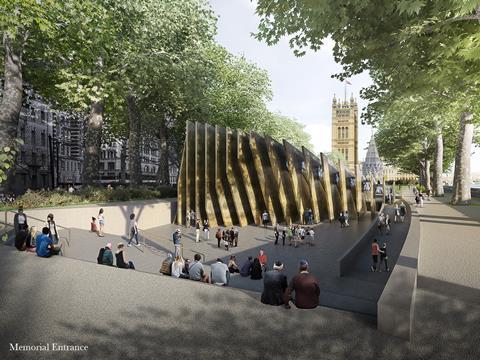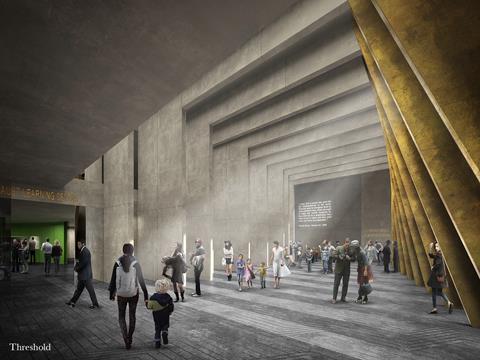DLUHC stands down architects to save cash as costs hit £102.9m, according to National Audit Office

Public-spending watchdog the National Audit Office has set out a litany of financial risks facing David Adjaye and Ron Arad’s controversial proposals for the UK Holocaust Memorial and Learning Centre at Victoria Tower Gardens, next to the Houses of Parliament.
According to the NAO, construction costs for the project – which had its planning permission quashed by the High Court in April – are now running at £102.9m, up 3% from the £99.7m full-business-case-figure one year ago, and up 16% on the £89m envisaged just three years ago. Annual operating costs for the memorial are estimated at up to £8m a year.
Project client the Department for Levelling Up, Housing and Communities is appealing the High Court’s decision, which found the consent granted to the proposals was a breach of a 1900 legal act protecting listed Victoria Tower Gardens. The NAO cautioned that further delays will push the project’s cost higher and said that securing planning permission was not the only obstacle faced by the department.
The NAO’s just-published report on the project said DLUHC is standing down architects and other members of the team not covered by cost penalties to save money amid the new delays caused by April’s decision and the department’s planned appeal.
Other measures include pausing letting the contract for the project’s basement “box”, which will house the memorial’s exhibition centre, until December this year, and pushing back the appointment of audio-visual and creative designers until autumn 2023.
Before April’s decision, DLUHC was hopeful that the project could be completed by autumn 2025, however securing consent is expected to add at least six months to the timeframe, suggesting completion will slip into 2026. The NAO said the department was reluctant to set new project milestones until it had a clearer view of how long its appeal against the High Court judgment would take.

Other complications cited by the watchdog include the process for setting up an organisation to run the memorial, for which the government’s preferred option is the creation of a dedicated non-departmental public body. The NAO said the time it could take to create such a body was an “additional risk” because government guidelines would need all other options to have been explored and require sign-off from HM Treasury and the Cabinet Office.
The NAO added that DLUHC’s holocaust memorial team lacked staff at senior levels with programme-management skills. It acknowledged that skilled staff had been hired, but said the project’s senior responsible owner and programme manager “do not have experience in leading major projects or programmes”, and that there were no concrete plans for them to receive formal training.
The NAO also said DLUHC had yet to start the fundraising process to secure the £25m in private donations required to top up construction costs, or the portion of running costs that donations are supposed to cover.
A DLUHC spokesperson said the NAO report confirmed the department’s own assessment of the risks associated with the “important and complex” project.
“We are pleased the NAO recognises that governance measures are in place, benefits of the programme have been clearly identified and that specialists with the necessary skills have been recruited,” they said.
“The government remains fully committed to delivering the memorial and learning centre at Victoria Tower Gardens – and with cross-party and communities’ support, we’re confident the programme will deliver a memorial that the UK will be proud of.”
David Adjaye and Ron Arad were named as the winners of a design competition for the memorial and learning centre in October 2017. They beat proposals from John McAslan, Foster & Partners, Studio Libeskind and Zaha Hadid Architects.
















No comments yet